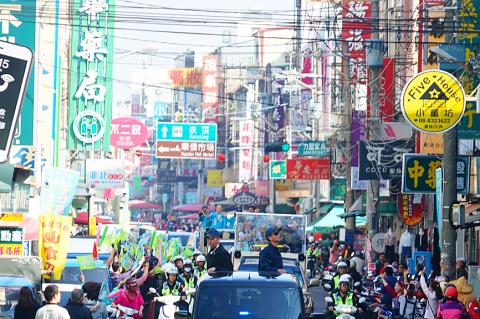President Tsai Ing-wen (蔡英文), the Democratic Progressive Party’s (DPP) presidential candidate, yesterday began a five-day motorcade campaign in the run-up to Saturday’s elections.
The motorcade set off from Pingtung County’s Fenggang Village (楓港), her ancestral home, yesterday.
Four years ago in the final week prior to the 2016 elections, she started a similar campaign event in Pingtung, where she experienced the most hospitality, Tsai said, adding that she looked forward to seeing poll results from her hometown the most.

Photo: Chen Yen-ting, Taipei Times
At noon, the motorcade arrived in Kaohsiung, where Tsai was joined by several DPP legislative candidates to seek support throughout the city.
The motorcade arrived in Tainan in the afternoon, where the Tainan Police Bureau mobilized nearly 900 peacekeeping officers to ensure a smooth tour.
Tsai rode behind bulletproof glass in the back of a jeep as she waved to onlookers.
The National Security Bureau has arranged for a vehicle of the same model to follow Tsai to minimize security risks, such as a malfunction of the primary vehicle, a bureau official said.
Later yesterday, Tsai attended a rally in Yunlin County’s Douliou City (斗六), before another rally in Chiayi City in the evening.
Separately yesterday, Tsai’s campaign office in Taipei released a video called “Speak Loudly” (大聲說話), which highlights how precious democracy is by contrasting peace and freedom in Taiwan with clashes and turmoil in Hong Kong, where Beijing’s “one country, two systems” formula is implemented.
The elections could determine whether Taiwan moves away from dictatorship or toward it, which is why every Taiwanese must cast the right votes to speak loudly their determination to stand with democracy, freedom and the world, the video said.
The video was directed by Lo Ging-zim (羅景壬), who has received more than 10 awards at home and abroad, such as “Best Commercial of the Year” and “Best Director,” Tsai campaign office spokeswoman Chien Hsu-pei (簡舒培) said.
The video was to appeal to the electorate, asking them not to accept the “one country, two systems” formula or the so-called “1992 consensus,” Chien said, adding that the ballots on Saturday could show the world Taiwan’s firm resolution.
The “1992 consensus” — a term former Mainland Affairs Council chairman Su Chi (蘇起) admitted making up in 2000 — refers to a tacit understanding between the Chinese Nationalist Party (KMT) and Beijing that both sides acknowledge there is “one China,” with each side having its own interpretation of what “China” means.
Additional reporting by Lo Tien-pin

Chinese Nationalist Party (KMT) Chairman Eric Chu (朱立倫), spokeswoman Yang Chih-yu (楊智伃) and Legislator Hsieh Lung-chieh (謝龍介) would be summoned by police for questioning for leading an illegal assembly on Thursday evening last week, Minister of the Interior Liu Shyh-fang (劉世芳) said today. The three KMT officials led an assembly outside the Taipei City Prosecutors’ Office, a restricted area where public assembly is not allowed, protesting the questioning of several KMT staff and searches of KMT headquarters and offices in a recall petition forgery case. Chu, Yang and Hsieh are all suspected of contravening the Assembly and Parade Act (集會遊行法) by holding

PRAISE: Japanese visitor Takashi Kubota said the Taiwanese temple architecture images showcased in the AI Art Gallery were the most impressive displays he saw Taiwan does not have an official pavilion at the World Expo in Osaka, Japan, because of its diplomatic predicament, but the government-backed Tech World pavilion is drawing interest with its unique recreations of works by Taiwanese artists. The pavilion features an artificial intelligence (AI)-based art gallery showcasing works of famous Taiwanese artists from the Japanese colonial period using innovative technologies. Among its main simulated displays are Eastern gouache paintings by Chen Chin (陳進), Lin Yu-shan (林玉山) and Kuo Hsueh-hu (郭雪湖), who were the three young Taiwanese painters selected for the East Asian Painting exhibition in 1927. Gouache is a water-based

Taiwan would welcome the return of Honduras as a diplomatic ally if its next president decides to make such a move, Minister of Foreign Affairs Lin Chia-lung (林佳龍) said yesterday. “Of course, we would welcome Honduras if they want to restore diplomatic ties with Taiwan after their elections,” Lin said at a meeting of the legislature’s Foreign Affairs and National Defense Committee, when asked to comment on statements made by two of the three Honduran presidential candidates during the presidential campaign in the Central American country. Taiwan is paying close attention to the region as a whole in the wake of a

OFF-TARGET: More than 30,000 participants were expected to take part in the Games next month, but only 6,550 foreign and 19,400 Taiwanese athletes have registered Taipei city councilors yesterday blasted the organizers of next month’s World Masters Games over sudden timetable and venue changes, which they said have caused thousands of participants to back out of the international sporting event, among other organizational issues. They also cited visa delays and political interference by China as reasons many foreign athletes are requesting refunds for the event, to be held from May 17 to 30. Jointly organized by the Taipei and New Taipei City governments, the games have been rocked by numerous controversies since preparations began in 2020. Taipei City Councilor Lin Yen-feng (林延鳳) said yesterday that new measures by